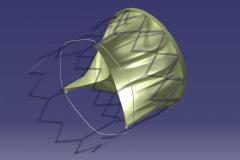Arash Kheradvar Receives Pair of Grants for Transcatheter Aortic Valve Research
Grants from Wallace H. Coulter Foundation and Institute for Clinical and Translational Science
 Assistant Professor Arash Kheradvar, M.D., Ph.D., The Edwards Lifesciences Center for Advanced Cardiovascular Technology, Department of Biomedical Engineering, has received a pair of grants for continuation of his research on the development of a novel self-expandable bioprosthetic heart valve for percutaneous delivery and implantation.
Assistant Professor Arash Kheradvar, M.D., Ph.D., The Edwards Lifesciences Center for Advanced Cardiovascular Technology, Department of Biomedical Engineering, has received a pair of grants for continuation of his research on the development of a novel self-expandable bioprosthetic heart valve for percutaneous delivery and implantation.
Kheradvar’s development of his percutaneous aortic valve system has recently gained much attention in the cardiovascular community. His success has resulted in grants from the Wallace H. Coulter Foundation as well as the Institute for Clinical and Translational Science (ICTS). The envisioned valve system, known as FOLDAVALVE, has a stent made of super-elastic Nitinol and is a self-deployable forming valve system suitable for transcatheter treatment of an aortic valve. The valve uses a fundamentally different concept for packaging and deployment compared to the current devices in clinical trials.
FOLDAVALVE is equipped with a guide-wire catheter that enables the interventionalist to reposition the fully expanded stent during the implantation procedure. Its unique design allows multiple delivery routes through trans-apical, trans-femoral and even subclavian approaches. The envisioned percutaneous heart valve system spares the leaflets from being crunched within the stent in a collapsed state. As a result, the valves can be easily packed sterile in their collapsed shape ready for the delivery procedure.
A considerable number of patients are not currently ready for percutaneous procedures due to the current limitations of the valve delivery size. Kheradavar’s project aims to develop a transcatheter valve system implantable in aortic-valve position with a delivery size of four millimeters in diameter, as opposed to other current technologies that have delivery sizes between six and 15 millimeters.
The term “percutaneous” refers to the procedures where access to inner organs is done via needle-puncture of the skin, rather than by using an "open" approach where inner organs or tissue are exposed. The attraction of percutaneous technologies lies in providing cost effective solutions to heart valve disease, thereby allowing more timely interventions with acceptable efficacy and minimal complications, especially for patients who otherwise would not undergo open heart surgery.
The competitive Coulter Translational Research Award seeks to support biomedical research that is translational in nature, and to encourage and assist eligible biomedical engineering investigators to establish themselves in academic careers involving translational research. These projects are directed at promising technologies with the goal of progressing toward commercial development and entering clinical practice. The ICTS is funded by the National Institutes of Health (NIH) and facilitates the ongoing process of transforming existing research and training activities at UC Irvine into a recognizable, integrated and flexible home for clinical translational science across the campus and throughout the community.
Wallace Henry Coulter was an engineer, inventor, entrepreneur and visionary. He was co-founder and chairman of Coulter® Corporation, a worldwide medical diagnostics company headquartered in Miami, Florida. The two great passions of his life were applying engineering principles to scientific research, and embracing the diversity of world cultures. The first passion led him to invent the Coulter Principle™, the reference method for counting and sizing microscopic particles suspended in a fluid. Coulter's deepest passion was the improvement of health care and to make these improvements available and affordable. Thus, it should come as no surprise, that Coulter dedicated his wealth to this cause and prior to his death, established the Wallace H. Coulter Foundation.
More information about Kheradvar’s research can be found on his laboratory website at: http://kheradvar.eng.uci.edu/
